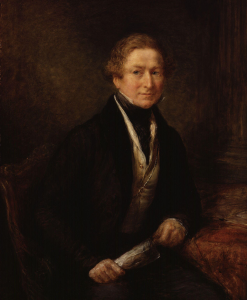4.2. Sir Robert Peel
Tiffany Morey and Kate McLean
Developments in 19th-century England heavily influenced the history of policing in the United States. Not only did municipal law enforcement radically change for the first time in over six centuries, but Sir Robert Peel set the stage for what is known today as modern policing. Home Secretary for the United Kingdom from 1828 to 1830, Peel believed that policing needed to be restructured in order to become effective. In 1829 he pushed the Metropolitan Police Act, which created the first British police force, and what we now recognize as the first modern police force. [1] In recognition of his influence, officers of the London Metropolitan Police became known as “bobbies.”

Sir Robert Peel is best known for the “Peelian Principles.” Peel did not himself codify these principles, but rather, scholars who have studied his work and writings have identified these mandates as essential to his policing philosophy.
1- The police must be stable efficient, and organized along military lines;
2- The police must be under government control;
3- The absence of crime will best prove the efficiency of police;
4- The distribution of crime news is essential;
5- The deployment of police strength both by time and area is essential;
6- No quality is more indispensable to a policeman than perfect command of temper; a quiet, determined manner has more effect than violent action;
7- Good appearance commands respect;
8- The securing and training of proper persons is at the root of efficiency;
9- Public security demands that every police officer be given a number;
10-Police headquarters should be centrally located and easily accessible to the people;
11-Policemen should be hired on a probationary basis; and
12-Police records are necessary to the correct distribution of police strength
Are these principles largely in line with what we expect of police today? Which principles do we take for granted, and which still seem aspirational (or something we continue to strive for)?

